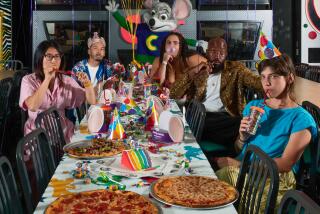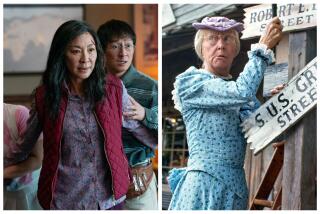“Mother, I’m saving myself for marriage.”
“Thirtysomething” is a popular television series, pacing--with no more than than the usual show-biz social lag--the yuppie generation as it grapples with responsibility, reproduction and the combination of the two.
Come to a preview of the sequel: “fortysomething.”
In a circle around the two-story-high marble fireplace of a large and expensively furnished home, in a neighborhood of large homes with motor homes and boats in the driveways, are seven couples, people who own horses and sailboats.
They have gathered to talk about their marriages.
Second marriages.
Chapter II is a social group for couples on the second time around. The thinking is, members say, that “first timers” do not understand the problems, hopes, dreams, humor or etiquette of those who introduce their mates with numbers.
“Couples in second marriages are different and face different challenges than couples in first marriages,” the host explained.
About a dozen couples belong. There used to be more, the host says, but the square-dance caucus, obsessed with the demands of their heady art, seceded.
There is another such group in the area, he says, which is “the direct opposite of us. They have professional counselors and they’re very serious and they talk about their former marriages. We don’t allow ex-spouse bashing.”
“I’ve been there--enough already with the war stories,” agreed a burly, rumpled man in a sweater of thick, fuzzy yarn.
“In fact, most of our activities center around food.”
And so tonight, between the introductions and the killer cheesecake, the group was going to discuss holiday problems.
It can, for example, become really complicated if both spouses in a former marriage not only marry and have children by a new spouse, but the ex-spouses also remarry and have yet more children.
The logistical demands on children and grandparents, the problem of simply determining who goes where and when and for how long, weigh heavily.
Past topics, the host said, had included finances (“there is the old one-pot system and the newer three-pot system: hers, his and ours”) and teen-age sex.
“That applies to us at the moment,” interjected a plump, black-haired woman with large silver earrings and Little Running Fawn fringed white boots.
Her 15-year-old stepdaughter, she said, was considering having sex with her boyfriend, and had asked for help with birth-control methods.
Should she help? Should she allow them to use the family home for liaisons?
Holiday problems vanished from the agenda as the couples poured out a string of similar experiences. Those with daughters of the same age--for some reason, they were almost always 15 when the subject arose--were facing the same question. Those with adult children recalled going through the same experience.
Here they were, retired veterans of the sexual revolution, the first generation to know the pill in college, the band that launched the great unshackling of the mid-1960s, faced with a “put up or shut up” from their children and stepchildren. Many of them had lived with their current spouses before remarrying, sometimes before the disapproving gaze of their own children.
A woman with a mass of chestnut hair, wearing a black jump suit tucked into high-heeled boots, talked about how, during her first marriage, she condemned the morals of a divorced neighbor whose boyfriend moved in with her.
“Of course, I wasn’t planning on getting divorced at the time,” she said. The years passed, she divorced and began dating again, and one day her boyfriend, now the husband sitting beside her, “came over for coffee and never went home.”
“I was a total prude, I never dreamed I’d be carrying on like that, but I was in love.”
Her teen-age daughter, however, “true to the upbringing I gave her, was very disturbed.”
When she offered to arrange birth-control pills for her daughter, she said, “She just looked at me and said ‘Mother, I’m saving myself for marriage.’ ”
But that daughter was not the rule.
Many of the others, somewhere along the line, had taken a teen-age daughter or stepdaughter to a doctor or a drugstore for birth-control help. The exception was one couple, who said they lectured their daughter that “you are not old enough to bear the responsibility,” and could not cooperate in her having sex.
But most agreed that this was not a battle they could win with “thou shalt nots.”
One woman said that she took her daughter to a birth-control clinic, obtained prescriptions, took her to a drugstore and examined birth-control items at home. Eventually the load of information left the girl so thoroughly awed “that she told the boy she just wasn’t ready for all this.”
One father suggested horses.
His teen-age daughter and her friends who have horses spend their energy on riding and have little left for boys, he said.
“No kidding. Three-quarters of the horses in the Valley are probably ridden by 15-year-old girls. We know a whole group of them. It puts off this whole business till they’re about 18.”
The others, skeptical at first, asked more questions about the horsy set as the night wore on and the pastry and coffee were served.
For some teen-age girls, now may be the time to ask mommy and daddy for a horse for a present.
They may be surprised at how rapidly mom and dad say yes.
More to Read
The complete guide to home viewing
Get Screen Gab for everything about the TV shows and streaming movies everyone’s talking about.
You may occasionally receive promotional content from the Los Angeles Times.






